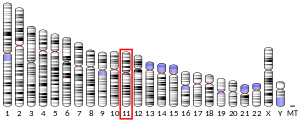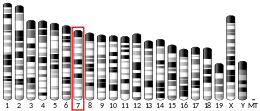STARD10
StAR-related lipid transfer protein 10 (STARD10) or PCTP-like protein is a lipid transfer protein that in humans is encoded by the STARD10 gene.[5][6] The protein derives its name from the fact that the molecule contains a START domain. As part of the StarD2 subfamily, StarD10 can transport the lipids phosphatidylcholine and phosphatidylethanolamine between membranes in solution.[7] Casein kinase II phosphorylates the protein on its serine at position 184.[8]
The function of StarD10 in the cell is not yet understood. Its expression is associated with cancer, but the nature of its role is unclear. Most recent data indicate that loss of StarD10 expression in breast cancer is associated with poor outcomes in patients.[9]
References
- 1 2 3 GRCh38: Ensembl release 89: ENSG00000214530 - Ensembl, May 2017
- 1 2 3 GRCm38: Ensembl release 89: ENSMUSG00000030688 - Ensembl, May 2017
- ↑ "Human PubMed Reference:".
- ↑ "Mouse PubMed Reference:".
- ↑ Scanlan MJ, Chen YT, Williamson B, Gure AO, Stockert E, Gordan JD, Türeci O, Sahin U, Pfreundschuh M, Old LJ (May 1998). "Characterization of human colon cancer antigens recognized by autologous antibodies". International Journal of Cancer. 76 (5): 652–8. doi:10.1002/(SICI)1097-0215(19980529)76:5<652::AID-IJC7>3.0.CO;2-P. PMID 9610721.
- ↑ "Entrez Gene: STARD10 START domain containing 10".
- ↑ Olayioye MA, Vehring S, Müller P, Herrmann A, Schiller J, Thiele C, Lindeman GJ, Visvader JE, Pomorski T (July 2005). "StarD10, a START domain protein overexpressed in breast cancer, functions as a phospholipid transfer protein". The Journal of Biological Chemistry. 280 (29): 27436–42. doi:10.1074/jbc.M413330200. PMID 15911624.
- ↑ Olayioye MA, Buchholz M, Schmid S, Schöffler P, Hoffmann P, Pomorski T (August 2007). "Phosphorylation of StarD10 on serine 284 by casein kinase II modulates its lipid transfer activity". The Journal of Biological Chemistry. 282 (31): 22492–8. doi:10.1074/jbc.M701990200. PMID 17561512.
- ↑ Murphy NC, Biankin AV, Millar EK, McNeil CM, O'Toole SA, Segara D, Crea P, Olayioye MA, Lee CS, Fox SB, Morey AL, Christie M, Musgrove EA, Daly RJ, Lindeman GJ, Henshall SM, Visvader JE, Sutherland RL (March 2010). "Loss of STARD10 expression identifies a group of poor prognosis breast cancers independent of HER2/Neu and triple negative status". International Journal of Cancer. 126 (6): 1445–53. doi:10.1002/ijc.24826. PMID 19676041.
Further reading
- Olayioye MA, Buchholz M, Schmid S, Schöffler P, Hoffmann P, Pomorski T (August 2007). "Phosphorylation of StarD10 on serine 284 by casein kinase II modulates its lipid transfer activity". The Journal of Biological Chemistry. 282 (31): 22492–8. doi:10.1074/jbc.M701990200. PMID 17561512.
- Olayioye MA, Vehring S, Müller P, Herrmann A, Schiller J, Thiele C, Lindeman GJ, Visvader JE, Pomorski T (July 2005). "StarD10, a START domain protein overexpressed in breast cancer, functions as a phospholipid transfer protein". The Journal of Biological Chemistry. 280 (29): 27436–42. doi:10.1074/jbc.M413330200. PMID 15911624.
- Tabibiazar R, Wagner RA, Liao A, Quertermous T (December 2003). "Transcriptional profiling of the heart reveals chamber-specific gene expression patterns". Circulation Research. 93 (12): 1193–201. doi:10.1161/01.RES.0000103171.42654.DD. PMID 14576202.
- Lai CH, Chou CY, Ch'ang LY, Liu CS, Lin W (May 2000). "Identification of novel human genes evolutionarily conserved in Caenorhabditis elegans by comparative proteomics". Genome Research. 10 (5): 703–13. doi:10.1101/gr.10.5.703. PMC 310876. PMID 10810093.
This article is issued from
Wikipedia.
The text is licensed under Creative Commons - Attribution - Sharealike.
Additional terms may apply for the media files.




